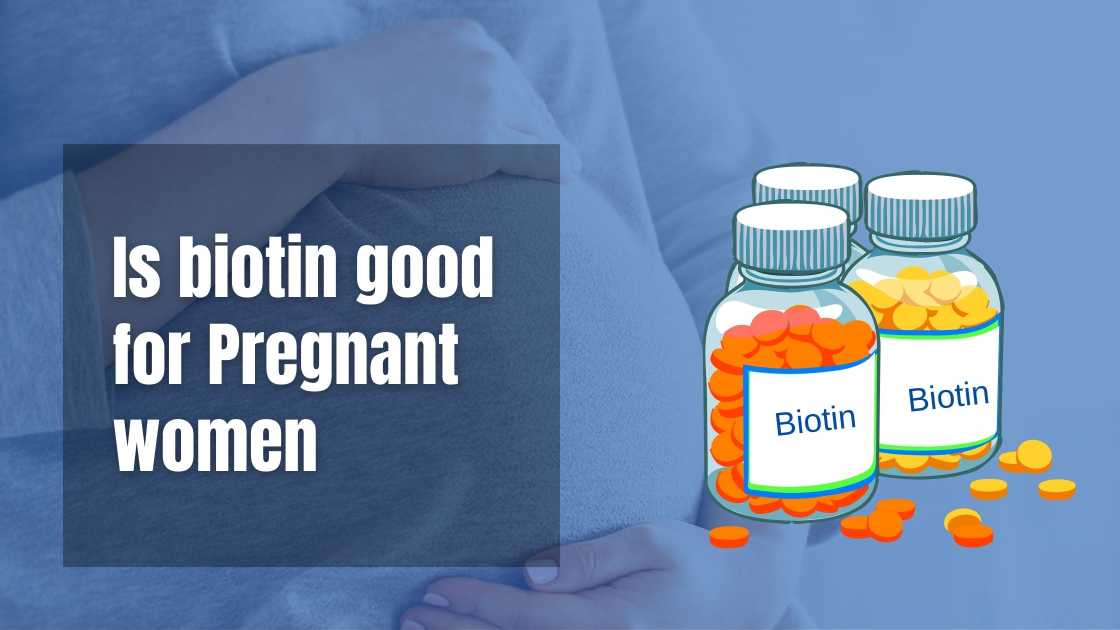During pregnancy, your body requires nutrients for the proper growth of the fetus. Nutrients such as vitamins, fiber, calcium, etc are all needed during pregnancy. Biotin is one of the vitamins that is really needed during pregnancy to promote the fetus’ health.
It is also known as vitamin H or vitamin B7. According to a 2009 article published in the Journal of Nutrition, many pregnant women are deficient in biotin.
Biotin deficiency in grownups can cause hair loss, facial rash, numbness, tingling, depression, and hallucinations, and it may also contribute to birth defects in babies with mothers who are deficient in this vitamin.
Read on to find the answer to the question “Can you take biotin while pregnant?”
What is biotin?
It is one of the B complex vitamins that aid the body in converting food into energy. Also known as vitamin B7, it is an essential nutrient for the human body. The word “biotin” comes from the ancient Greek word “biotos,” which means “life” or “sustenance.
Biotin is good for keeping your skin, hair, eyes, nervous system, and liver in a healthy state. There are also claims that biotin can regulate blood sugar. It is also good for pregnant women and essential for embryonic growth.
The recommended intake of biotin for adolescents and adults is between 0 and 100 micrograms (mcg) per day. Due to it being water-soluble, excess biotin will pass through the body when you pee. While most people can handle biotin supplements, some people report mild side effects like nausea and digestive issues.
Sources of biotin
Biotin can be found in foods such as nuts, soybeans, whole grains, cereals, organ meats (liver, kidney), bananas, and mushrooms.
Processed foods have ineffective biotin. This is because of the many processing methods done of the food reducing its effectiveness.
Symptoms of biotin deficiency
Below are some of the symptoms of lack of biotin in the body
- Poor nail and hair health
- Increased risk of seborrheic dermatitis
- Diabetes
- Peripheral neuropathy
- Fatigue
- Reduced appetite
- Depression
- Insomnia
What happens if I take too much biotin?
Having excess biotin in the body is rare, however, taking large amounts can create false positives in laboratory tests for thyroid disease. Some signs and symptoms of biotin overdose include excessive thirst, insomnia, and urination.
Can I take biotin during pregnancy?
The intake of biotin during pregnancy is highly recommended during pregnancy. It can also supplement the vitamin B deficiency during pregnancy.
Biotin is essential for the proper growth and development of the fetus. Also, during pregnancy, the body breaks down biotin more quickly which can cause a deficiency for many pregnant women.
According to the Linus Pauling Institute and the American Journal of Clinical Nutrition, between one-third and one-half of all pregnant women experience a decline in biotin.
Biotin deficiency usually occurs during the late stages of pregnancy. Taking biotin during pregnancy can help prevent biotin deficiency.
What is the recommended dosage for pregnant women?
Expectant women should have an intake of at least 25-30 mcg of biotin per day. The symptoms of toxicity do not happen at this dosage. Biotin supplements of this dosage can also help an expectant woman prevent the issues caused by biotin deficiency.
Can biotin cause birth defects?
Biotin can cause birth defects in some cases. A deficiency of biotin in pregnant women may also lead to birth defects.
In a study conducted on animals, it was proven that the deficiency of biotin might result in birth defects in animals, particularly issues like cleft palate, skeletal deformities, cleft lip, etc. It is possible for these effects to show up in humans as well.
The takeaway from this article?
Biotin is very important for the body. It is good to add biotin to your daily diet especially for pregnant women. Expectant women should have an intake of at least 25-30 mcg of biotin per day.








Leave a Comment